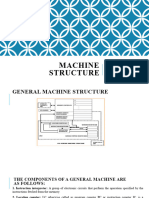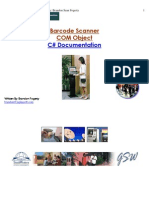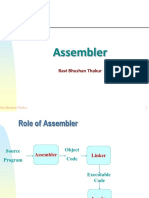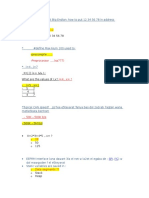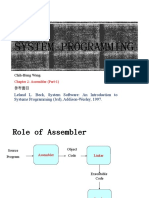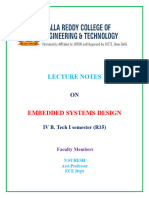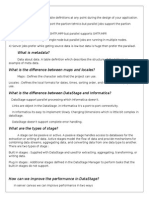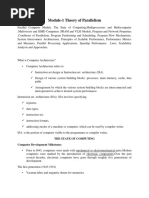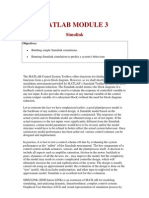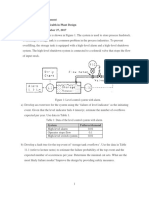Design Patterns in C++ For Embedded Systems
Uploaded by
Kaustubh GandhiDesign Patterns in C++ For Embedded Systems
Uploaded by
Kaustubh GandhiCourse DP-402: Design Patterns in C++ for Embedded Systems
Course Description:
Everyone seems to be talking about design patterns these days. This course is designed to provide delegates with a basic understanding of design patterns how they can be applied to realtime C++ embedded systems. It addresses the following questions: What are design patterns and why do I need to know about them, especially in embedded systems? Who are the Gang of Four and how is their work relevant? Which patterns are easy to work with and are most commonly found in embedded systems? Are there any specific patterns to embedded systems? What are anti-patterns? What is the difference between a pattern and an idiom?
Course Outline:
Introduction
History What is a design pattern? GoF design patterns Typical problems in embedded systems Design patterns in embedded systems Intention of this course
Creational Patterns
Singleton Abstract Factory Builder Prototype Factory
Structural Patterns
Overview:
This 4 day course will provide practical, hands-on experience with the core design patterns, uniquely addressing their suitability to a non-PC programming environment.
Course Objectives:
Provide a basic understanding of Design Patterns and how the language of patterns can aid designers and developers to be more productive. Provide practical experience of working with Design Patterns. Provide an understanding of the significant Gang of Four set of classical patterns and patterns associated specifically with multi-tasking embedded systems. Demonstrate how the patterns language can be used to document bad designs as, so called, anti-patterns. Gain the confidence to apply these new concepts to your next real-time project. Develop an understanding of Object Orientated principles through the lessons of others that are captured by design patterns. A good working knowledge of C++. An understanding of Object-Oriented principles. UML class modelling is useful, but not essential.
Bridge Smart Pointers Reference counting Adapter Decorator Faade Composite Proxy Flyweight
Behavioural Patterns
Chain of Responsibility Strategy Template method Interpreter Iterator Mediator
Object Orientated Callbacks
Observer C++ callbacks Command pattern Publish and Subscribe
Anti- Patterns
God class Lava flow Poltergeists Stove Pipe
Pre-requisites:
Real Time Patterns
Threading Mutex Semaphores Thread Pools Barriers Futures Latches Exchangers Notifications Executors Transactions
Who Should Attend?
The course is aimed at software developers, designers, and architects wishing to make use of design patterns or software engineers in general who require a good briefing before deciding on their suitability to their projects. Design Patterns aid considerably in collaborative working and the sharing of knowledge, at least initially by drawing on many external sources.
Duration:
Four days.
Real Time Anti-patterns
Thread Affinity Race conditions Deadlock Livelock Priority inversion
Course Materials:
Delegate handbook.
Related Courses:
Feabhas Ltd 5, Lowesden Works Lambourn Woodlands Hungerford, Berkshire RG17 7RY, UK
Tel: +44 (0) 1488 73050 Fax: +44 (0) 1488 73051
Real-Time Software Design with UML 2.0 [OO-503] Advanced C++ for Embedded Systems [AC++-501] Embedded Software Testing [T-401]
Course Workshop:
The course exercises are designed to foster an understanding of design patterns, object orientation, and C++. Ample opportunity is provided for delegates to consider the implications of patterns to the size and space concerns of embedded systems whilst reflecting on the broader quality issues that they directly address.
Email: info@feabhas.com Web: www.feabhas.com
Last updated 21/6/10
You might also like
- Unit 1 Introduction To Embedded SystemsNo ratings yetUnit 1 Introduction To Embedded Systems61 pages
- (FREE PDF Sample) Mastering Embedded Linux Programming Second Edition Unleash The Full Potential of Embedded Linux With Linux 4 9 and Yocto Project 2 2 Morty Updates Chris Simmonds Ebooks100% (5)(FREE PDF Sample) Mastering Embedded Linux Programming Second Edition Unleash The Full Potential of Embedded Linux With Linux 4 9 and Yocto Project 2 2 Morty Updates Chris Simmonds Ebooks52 pages
- Cobol V - Compiler and Runtime Migration Guide PDFNo ratings yetCobol V - Compiler and Runtime Migration Guide PDF420 pages
- Sorting A Series of 10 Numbers: FlowchartNo ratings yetSorting A Series of 10 Numbers: Flowchart4 pages
- Lab Manual # 03 Implementation of Flag Registers100% (1)Lab Manual # 03 Implementation of Flag Registers4 pages
- Data Segment Data Ends Code Segment Assume Ds:Data, Cs:Code: 1) 8086/masm Program On Fibonacci Series75% (4)Data Segment Data Ends Code Segment Assume Ds:Data, Cs:Code: 1) 8086/masm Program On Fibonacci Series15 pages
- Unit 3: Embedded Firmware & Hardware Design and Development100% (1)Unit 3: Embedded Firmware & Hardware Design and Development22 pages
- Microprocessor and Interfacing Techniques: (Course Code: CET208A) Credits-3No ratings yetMicroprocessor and Interfacing Techniques: (Course Code: CET208A) Credits-3147 pages
- Introduction To Embedded Systems Design On FPGAsNo ratings yetIntroduction To Embedded Systems Design On FPGAs20 pages
- Project 3: Writing A Kernel From Scratch: 15-410 Operating SystemsNo ratings yetProject 3: Writing A Kernel From Scratch: 15-410 Operating Systems44 pages
- Instant download Communications Receivers: Principles and Design, 4th Edition Ulrich L. Rohde pdf all chapter100% (2)Instant download Communications Receivers: Principles and Design, 4th Edition Ulrich L. Rohde pdf all chapter21 pages
- Intel Microprocessor History: Ramzi Shihadeh Alqrainy100% (2)Intel Microprocessor History: Ramzi Shihadeh Alqrainy48 pages
- Module-1 Theory of Parallelism: The State of Computing Computer Development MilestonesNo ratings yetModule-1 Theory of Parallelism: The State of Computing Computer Development Milestones48 pages
- Design & Verification of AMBA APB ProtocolNo ratings yetDesign & Verification of AMBA APB Protocol4 pages
- Jump, Loop and Call Instructions: University of Engineering and Technology TaxilaNo ratings yetJump, Loop and Call Instructions: University of Engineering and Technology Taxila93 pages
- Formal Methods Applied to Complex Systems: Implementation of the B MethodFrom EverandFormal Methods Applied to Complex Systems: Implementation of the B MethodNo ratings yet
- C++ Programming - Code - Design PatternsNo ratings yetC++ Programming - Code - Design Patterns18 pages
- Requirements Patterns For Embedded Systems - Sascha Konrad, Betty H.C. ChengNo ratings yetRequirements Patterns For Embedded Systems - Sascha Konrad, Betty H.C. Cheng10 pages
- 2011 KSAE Annual Conference and ExhibitionNo ratings yet2011 KSAE Annual Conference and Exhibition1 page
- Experiment No.: Title-Combustion Chambers in S. I. & C. I. EnginesNo ratings yetExperiment No.: Title-Combustion Chambers in S. I. & C. I. Engines10 pages
- The Evolution of Programming Languages - GeeksforGeeksNo ratings yetThe Evolution of Programming Languages - GeeksforGeeks7 pages
- DeltaV SIS With Electronic Marshalling Certificate Rev 1.2 Oct 2 2014No ratings yetDeltaV SIS With Electronic Marshalling Certificate Rev 1.2 Oct 2 20142 pages
- Chapter 2: The Development of Enterprise Resource Planning Systems100% (1)Chapter 2: The Development of Enterprise Resource Planning Systems18 pages
- Madan Krishna Siwakoti: Java Developer Professional SummaryNo ratings yetMadan Krishna Siwakoti: Java Developer Professional Summary3 pages
- Modern Workplace Engineer - Job DescriptionNo ratings yetModern Workplace Engineer - Job Description1 page
- Difference Between Quality Assurance (QA) and Quality Control (QC) - Software Testing ClassNo ratings yetDifference Between Quality Assurance (QA) and Quality Control (QC) - Software Testing Class3 pages


